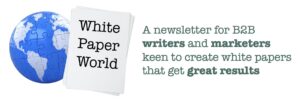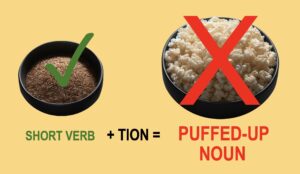
Copywriters: To get more from your white papers, repurpose
You’ve written a white paper.
Can you make more income from this project?
Yes, you can. At the same time, you’ll deliver great value to your clients. Best of all, it’s easy to do.
The secret: repurposing
Repurposing means using content from your white paper to create other documents such as press releases, blog posts, or slide decks.
This way your client gets more than one “kick at the can” or chance to engage prospects.
So, why should you offer to redo your white paper in different formats?
Well, you already know the content better than anyone else. You’re the one who researched and wrote it.
And your clients don’t have time to do it. Most B2B marketing teams have no one to do these additional writing chores.
So why shouldn’t you be the one who turns your white paper into other useful formats?
More kicks at the can
You may be uncomfortable with upselling, but it’s important to understand that you are doing your clients a great service.
They are much better off with four or five pieces to promote than just one:
- Each format may appeal to different prospects
- A new campaign can remind the same prospects about something they missed
- Each piece can have a separate social media and promotional campaign
A wave of promotions is usually much more effective than any one-off campaign.
This isn’t new, this is classic
In his article, 10 ways to use one piece of content, Duct Tape Marketing founder John Jantsch says the point isn’t simply to recycle content into different media.
“It’s giving the same content a different and needed useful stop along the customer journey,” he said.
That’s the goal with every format we’re talking about:
- Each bite-size piece is available for those who prefer the new formats
- Each piece points back to the original white paper
This took a long time to learn
Gordon told me he remembers when the power of repurposing first became clear to him. He had a client begging him to write a press release based on a project he had just sent in.
He kept saying, “No, I don’t really do those.”
But the client had no one else to turn to, so they kept asking until he finally caved. Gordon figured the most he could possibly charge for something so simple was $250. He knew the content so well, that press release took him 20 minutes to write.
A pretty good hourly fee!
The crazy thing is that Gordon spent more time saying “No” to his client than it took him to actually write the piece. The client was delighted in the end.
How much can you charge for repurposing?
Like everything else, there’s a range of fees. Here’s a price guide drawn from Gordon’s recent online course, Crash Course in B2B Writing.
This table shows the potential fees you can charge for repurposing a white paper into additional formats.
| Type of Content | Typical Fees |
| Blog posts | $250 to $500 |
| Placed articles | $500 to $1,250 |
| Press releases | $250 to $500 |
| Slide decks | $100 to $400 per slide, depending on production values |
You can see that recycling the same material into a few blog posts and a press release, or transforming it into a slide deck, can easily earn you another $1,000 or more.
In future articles, we’re going to look at creating each of these formats using a real white paper that we recently repurposed.
It’s not hard to start repurposing
You can provide a lot of added value to your clients by offering to create other related pieces as you produce a white paper.
So next time you bid on a white paper, ask the client if they could use the same content in different formats, like a press release, a set of blog posts, or a slide deck.
If they say “yes” ask if they have anyone who can do that. Chances are better than 50-50 they will say, “Well… we’re all pretty busy.”
That’s when you offer to help.
You can either add on other items for an added fee, or use them as bargaining chips to justify a white paper fee that may be higher than other contenders.
Either way, repurposing is an easy way to earn more on any white paper project, quickly and easily.
Have you ever repurposed a white paper? What other formats have you provided? How hard were they to create? Please leave a comment below.
Want to hear whenever there’s a fresh article on this site? Subscribe here to stay in the know on long-form content. From time to time, we’ll also send you word about some great new resource or training. And you can unsubscribe any time.



